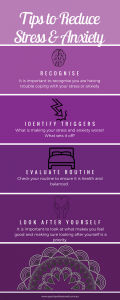 Stress and Anxiety – What’s the difference?
Stress and Anxiety – What’s the difference?
In today’s society, we are all busy and it seems in some circles, the label of being “busy” and “stressed” is nearly a badge of honour and the term “anxiety” is used nearly as often. We like to multitask, and we like to feel as though we are living our life to the fullest. We have jobs, attend university, are parents, friends, children. We have countless roles and live up to expectations set by ourselves and sometimes set by others. But how do we know if it’s getting to be a little bit too much? And what toll does this take on our minds and our bodies?
What is stress?
Stress is caused by common human experiences including (but definitely not limited to): relationship difficulties, workload, starting a new job, parenting, moving house, sickness within the family and the list goes on. What makes you stressed out may not be the same for your friend, spouse or neighbour. Importantly, not all stress is bad. A small amount of stress often helps us be more productive and focussed, for example ahead of a meeting or exam; or by keeping us safe in a dangerous situation as our body goes into “fight, flight or freeze mode,” for example, allowing us to swerve or break quickly if a person or animal suddenly walks in font or our car. The problem comes when we are feeling stressed more often than not, and it starts to take a toll on our mind and our body.
How do I know if I’m experiencing stress?
Symptoms of stress are physical and mental. They can include:
- Feeling tense
- Feeling overwhelmed
- Headaches and stomach aches
- Poor sleep and fatigue
- Poor concentration and focus
- Irritability
- Experiencing worry
- Difficulties winding down
What is anxiety?
Anxiety differs from stress in that it is defined as anticipation of future threats. It means that people experiencing anxiety are often on edge, waiting for something bad to happen or a perceived threat to arise. People can have general anxiety, whereby they worry about a range of different things (work, school, relationships, judgement, germs and so on) or a specific anxiety that is around something in particular, such as social situations.
How do I know if I’m experiencing anxiety?
Like stress, symptoms of anxiety are physical and mental. These can include:
- Excessive worry that is difficult to control
- Feeling on edge
- Feeling breathless
- A tightness across the chest
- Sweating without physical exertion
- Increased heart rate without physical exertion
- Difficulty concentrating or the feeling of your mind going “blank”
- Poor sleep and fatigue
- Difficulty winding down
- Stomach aches
So what can I do?
 If you have looked at these lists and thought, “oh my gosh, that is me!” there are things you can do to help reduce your stress or anxiety.
If you have looked at these lists and thought, “oh my gosh, that is me!” there are things you can do to help reduce your stress or anxiety.
Step 1:Recogniseif you are worrying to the point you are finding it difficult to engage in the things in your life you need and want to do (ie. getting to work, or school, catching up with friends, going to the grocery store). If so, you may need to seek some professional help. And that’s OK!!!
Step 2:Figure out your triggers. Are you prioritising other people’s needs over your own? Have you stretched yourself a little too thin? Are you setting yourself (or others) unrealistic expectations? Sometimes we can change things (ie. Making sure to set boundaries with work and not staying past 6pm or saying no to your toddler’s 5thplay date for the week) and sometimes we can’t. In those instances, it’s a matter of recognising your power and also allowing yourself to prioritise your own self care as well as doing the mandatory things (see Step 4).
Step 3:Look at your routine.Are you getting enough sleep? Most adults need between 6 and 9 hours of sleep per night. Are you eating a balanced diet (most of the time)? Are you getting active a couple of times a week? And finally, are you allowing yourself time to be doing activities you enjoy and that allow you to recharge? If not, its time to have a serious think about your priorities and how you can adjust certain aspects to allow you to do so.
Step 4:Prioritise Self Care.Self care is perhaps the most important part of this whole list. Self care means you are making your own health and wellbeing a priority. Universal acts of self care mean sleeping and eating well, exercising and engaging in a relaxation strategy (for example controlled breathing or mindfulness). Other aspects of self care are personal and specific to you. Figuring out the things you do that make you feel recharged and refreshed will help to reduce your overall level of stress and anxiety. These could be anything from watching an hour or two of Netflix, to taking your dog for a walk, to hanging out with friends or family, to baking, to reading, to drawing. The point is, the list is endless. Self care is not selfish, it is vital to reducing stress and preventing overwhelming stress and anxiety in the future.
